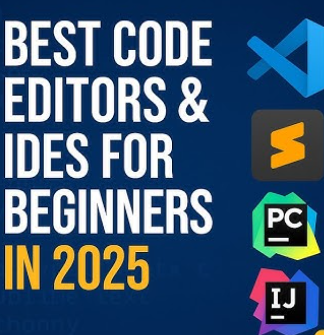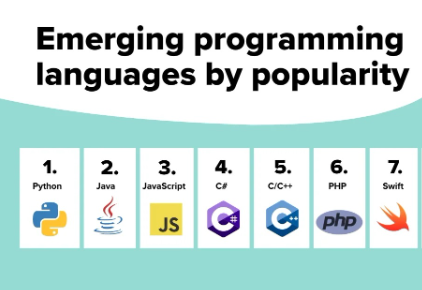
Best Code Editors and IDEs for Beginners
If you’re just starting your programming journey, you might be wondering:
What tool should I use to write and run code?
With so many options—VS Code, PyCharm, Eclipse, Replit, and more—choosing the right code editor or IDE can feel confusing.
This guide will help you understand the difference between code editors and IDEs, and introduce the best beginner-friendly tools for different programming languages and goals.
What’s the Difference Between a Code Editor and an IDE?
| Feature | Code Editor | IDE (Integrated Development Environment) |
| Purpose | Lightweight tool to write code | Full suite with editor, debugger, tools |
| Speed | Fast and simple | Heavier, more advanced |
| Examples | VS Code, Sublime Text, Notepad++ | PyCharm, Eclipse, IntelliJ |
| Best For | Beginners, web dev, small projects | Larger or complex projects |
Tip: Start with a code editor, then move to an IDE when you need more features.
1. Visual Studio Code (VS Code)
Best for: All beginners (web, Python, JavaScript, C++, more)
VS Code is the most popular free and lightweight code editor from Microsoft. It’s fast, flexible, and supports many languages through extensions.
Features:
- Built-in terminal and debugger
- Extensions for Python, HTML, CSS, Java, C++
- Git integration for version control
- Themes and customization
Why Beginners Love It:
- Easy to install and use
- Clean interface
- Tons of tutorials available
Related: JavaScript for Beginners | What Is It Used For?
2. PyCharm (Community Edition)
Best for: Python beginners
PyCharm, by JetBrains, is a full-featured IDE made for Python. It’s great for learning, especially if you plan to do data science, AI, or scripting.
Features:
- Smart code suggestions
- Built-in terminal and debugger
- Virtual environment support
- Syntax highlighting and error checking
Why It’s Great:
- Python-focused features
- Helps you organize files and projects
Tip: Use the free Community Edition if you’re just starting out.
3. Eclipse IDE
Best for: Java learners and CS students
Eclipse is one of the oldest and most powerful IDEs for Java and other enterprise-level languages.
Features:
- Excellent for Java, C++, PHP
- Auto-completion, debugging, project explorer
- Widely used in universities and big companies
Why It’s Useful:
- Helps with larger-scale Java or Android projects
- Great for those studying computer science
Related: Java vs Python | Which One Should You Learn First?
4. Online Compilers & Editors (No Install Needed)
Best for: Quick practice, beginners with low-end PCs, or Chromebook users
Don’t want to install anything yet? No problem! These browser-based editors let you start coding right away.
Top Free Online Editors:
- Replit (all-in-one editor and runner) → replit.com
- JSFiddle (for HTML/CSS/JS) → jsfiddle.net
- Programiz (Python, C, Java) → programiz.com
Why Use Them:
- No setup or installation needed
- Great for testing small programs or learning on the go
- Often include built-in tutorials or code examples
Related: Top 5 Free Platforms to Learn Coding
Bonus Mentions
Notepad++
- Lightweight editor for Windows
- Great for HTML, CSS, and basic scripting
IntelliJ IDEA (Community)
- Best for Java development (alternative to Eclipse)
- Supports many languages with extensions
Quick Comparison Table
| Tool | Best For | Type | Platform | Free? |
| VS Code | All-round coding | Editor | Windows/macOS/Linux | Yes |
| PyCharm | Python devs | IDE | Windows/macOS/Linux | Yes (Community) |
| Eclipse | Java, CS students | IDE | Windows/macOS/Linux | Yes |
| Replit | Online quick coding | Online IDE | Browser | Yes |
| Notepad++ | Simple scripts | Editor | Windows | Yes |
Final Tips: How to Pick the Right Tool
- Want a flexible tool for any language? → VS Code
- Learning Python? → PyCharm
- Focusing on Java or enterprise apps? → Eclipse
- Using a Chromebook or coding on-the-go? → Replit
- Just testing or writing basic HTML/CSS? → Notepad++ or JSFiddle
Don’t overthink it—start simple, and switch tools as your skills grow!


